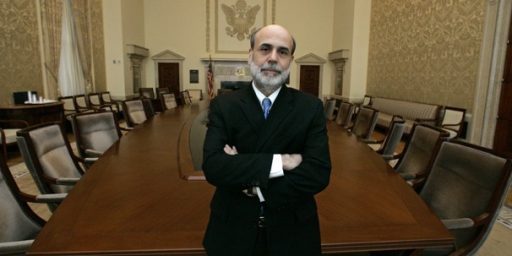Ron Paul vs. the Tea Party?
The Dallas Morning News reports that Ron Paul is facing three Republican primary challengers, all of whom align themselves with the Tea Party movement.
Paul, the Gulf Coast congressman whose 2008 presidential run excited libertarians nationwide, even though he didn’t get much traction overall, is considered by many to be the “father of the Tea Parties.” But he has three opponents in the March Republican primary — more than he has faced in his past six primary campaigns combined.
All three have ties to the anti-tax Tea Party movement. And while Paul remains the odds-on favorite to win re-election in his district, the crowded primary highlights the potential conflict between Tea Party activists and a GOP hoping to ride their wave to electoral success this fall.
“The Tea Parties have awakened a lot of everyday people here and across America,” said Tim Graney, one of Paul’s opponents. “And Ron Paul is worried about getting swept up in the anti-incumbent wave as if he is some exception.”
This is pretty fascinating, as the primary thrust of the Tea Party movement is ostensibly about fiscal conservatism, cutting government spending, and adhering to small government principles. Well, Ron Paul is definitely a fiscal conservative. To a fault, really.
So it’s ironic that the complaints about him from his opponents is his oppostion to federal spending and adherence to small government principles.
Tea Party associations aside, many of the challengers’ criticisms echo concerns of Paul’s past opponents: that he is too focused on his national ambitions; that his views are too extreme; that he doesn’t support the wars in Iraq and Afghanistan; that he votes “no” on everything, including federal aid for his district after Hurricane Ike.
This type of opposition begs the question of whether the Tea Party movement, at least in Ron Paul’s district, is really about what it says it’s about.






What the Tea Party movement isn’t is a top-down organization, so naturally if you try to analyze it that way you won’t see the results you expect.
Or you can default to conspiracy theories. Your choice.
I don’t know why I bother to add qualifiers to my sentences since those qualifiers apparently go unread.
@Charles
Or you could say the TPM is pretty vague as to what it’s about, and the rest of us are left to try and figure it all out. Oh, and saying “adhering to the Constitution” doesn’t count unless you explain what, on the TPM understading of the Constitution, it would mean in practice. You know, like, what would the TPM cut out of government? Social Security? Medicare? Medicaid? Got any specifics you can share with us?
I’m not a Tea Party member, whatever that is, but I can see that the Tea Party movement is motivated a lot more by what it is against than what it is for, you know, in a limited government with enumerated powers sense, there’s a desire to get back to that and stop the ever increasing tide of federalism that will be the death of the Republic and, dare I say it, lead us all into serfdom.
The Tea Party movement taken as a whole is fractured, at times incoherent, and certainly not all marching to the same drummer, and yet the questions you ask insinuate that it must in order for you to be able to understand it. Well, no. Mostly they have adopted the old Buckley saw of standing athwart history yelling, “Stop!” That in and of itself does not constitute a governing philosophy, but it may be a necessary first step in stemming the tide of debt and increased federal control of our lives.
Sometimes, I think many of you still haven’t grasped just how fed up many people (not just partisan or parochial interests) are with the trajectory of the federal government’s spending and control. We don’t want to be like Europe, really, we don’t.
Primary challenges are common and any challenger will exploit whatever advantage they can find. Let’s not lose sight of the fact these are coveted jobs that politicians want badly. Three challengers seems very reasonable.
If the Tea Party backs one or more of the challengers it could be for a number of reasons. They might be just as fiscally conservative as Paul without the baggage that he carries (the kookiness). It may be the national defense issue which is uniformly a top issue for the Tea Party. Perhaps they just think it’s time for new blood.
Calling him on voting no for reasonable aid after a hurricane doesn’t make the Tea Party hypocrites. Being small government doesn’t automatically make one no government. Those federal taxes being paid should sometimes come back to a district as aid.
There seems to be those looking for inconsistency in Tea Party ambitions and goals. Like Charles Austin pointed out a grass roots movement is bottom up not top down so there might be some difficulty understanding why it doesn’t fit the standard models. Some would call them the party of no but the fact is sometimes no is the best thing to say.
No, it’s talking about fiscal conservatism, cutting government, etc. Once safely elected, they don’t want anyone to actually do anything about them.
Charles, I completely understand that. And no Congressman in the last 30 years epitomizes opposition to federal spending and control than Paul. That is what Alex is saying.